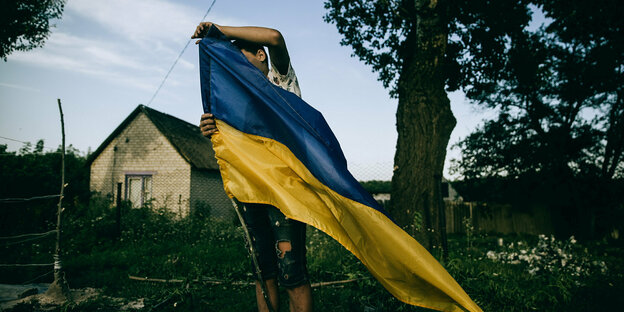As the Federal Republic of Germany increases aid to Ukraine, US money is at risk. But a defeat puts the entire Western world in danger.

A ray of hope in the hotly contested Kharkiv region: a young man raises a Ukrainian flag Photo: Julia Kochetova/World Press Photo/dpa
Someone says that Green Vice Chancellor Robert Habeck did not make any physical effort during his solidarity visit to kyiv on Thursday this week. A train trip to the Ukrainian capital is difficult, but it allows you to experience with your senses how close we are to this war in the center of Europe.
Ukraine needs all the support “in its fight for freedom,” Habeck said. It sounds cliché, but that doesn't make it any less true. The statements of Boris Pistorius (SPD) in the magazine Focus Many Ukrainians may also have registered carefully.
The Federal Minister of Defense still believes that a Ukrainian victory is possible, but everything must be done to achieve it. And Chancellor Olaf Scholz? Not only has he secured the delivery of another Patriot system, but now he is also pressuring other NATO partners to do the same as Berlin.
Something is moving again, but, to put it in the language of politicians that no one can hear anymore: we have to be honest. It's urgent, time is running out.
From a military perspective, Ukraine is up to its neck and has to deal with dead and wounded every day. Russia, the aggressor, has been able to gain some ground in eastern Ukraine in recent weeks. Critical infrastructure is being systematically attacked and, from Moscow's point of view, this is a success. Many of the thermal power plants have been destroyed.
Serving in the military is not something you can do yourself.
Kharkiv is constantly under attack. Making the great eastern city uninhabitable, which Russian troops failed to take in 2014, is apparently the Kremlin's stated war goal. Vladimir Putin (still) has enough “human material” that can be burned in Ukraine. A life in Russia counts for nothing.
On the contrary, Ukraine is on the defensive. There is a shortage of ammunition, weapons – especially air defense – and soldiers. As things stand, Ukrainian troops are in danger of not even being able to hold the current front lines. There has been a long fight to introduce changes to the mobilization law, which President Volodymyr Zelenskyj recently signed.
It shows that serving in the military is not something you can do on your own. This is all the more true in a country where, unlike Russia, there is an alert, agile, but increasingly exhausted civil society. Furthermore, there is growing uncertainty about the reliability of Western allies.
What happens if the US House of Representatives does not release the proposed $61 billion in aid this weekend? What happens if promised weapons deliveries are delayed? What would happen if Ukraine became a secondary theater in the event of an escalation of the conflict in the Middle East? After all, attention is already a rare commodity. As long as it takes?
People like politician Sahra Wagenknecht have a clear answer: no. Since war cannot be decided on the battlefield in the foreseeable future, the time must come for diplomacy to stop the deaths.
At war with the “collective West”
Apart from the fact that Ukrainians in particular want nothing more than this, this demand must seem like a mockery to them. For Ukraine, this war that Russia has launched is about nothing less than to be or not to be.
That's not the only thing that is ignored. The question of what should be negotiated with Russia is also unanswerable. On this point, Moscow's position leaves nothing to be desired in terms of clarity: negotiate, yes, but only on our terms. In simple terms, this means giving up on people who are exposed to violence, coercion and repression under Russian occupation and accepting that they will not be the last.
But the madness could not stop in Ukraine. Moscow has long considered itself at war with the “collective West.” The Kremlin assumes sovereignty over interpretation, invalidating the West's argument that NATO must carefully weigh each individual arms delivery to avoid becoming a party to the war.
Avoid past mistakes
Policymakers in Europe and the US would have to decide whether they want to continue this escalation or commit to a Ukrainian victory, writes Ukrainian political scientist Mykola Bielieskow in an article for the website of the US think tank Atlantic Council.
“If Ukraine does not have the means to defeat Russia on the battlefield, Putin will achieve a historic victory that will transform the international security climate. If that happens, the current emphasis on avoiding escalation will be seen as the biggest geopolitical mistake since the appeasement policies of the 1930s.”
A mistake that could still be avoided if people had learned from history. But that has gone wrong several times. Unfortunately.
